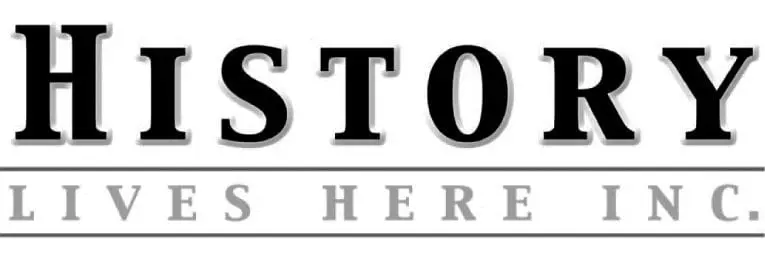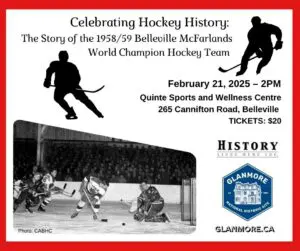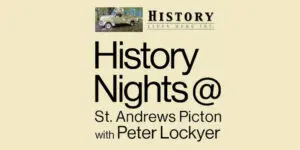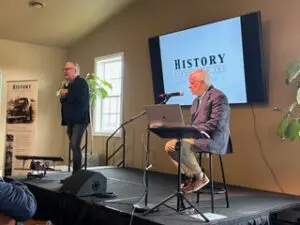Hello and welcome. My name is Peter Lockyer and I have a company named History Lives Here Inc.
History Lives Here provides a wide range of communication and multimedia services to its clients – businesses, industry associations and communities celebrating significant anniversaries. Simply put, we’re storytellers. We tell old stories to new audiences using today’s technologies.
We’re here today to launch the 2010 edition of the History Moments series. These are short video vignettes on local history themes that play before movies at The Regent, are broadcast on Cogeco Cablevision, have been distributed into area schools, libraries, archives and museums, are part of the interpretative program to the over 550,000 annual visitors to the Sandbanks Provincial Park, and are available online through the company’s website www.historyliveshere.ca
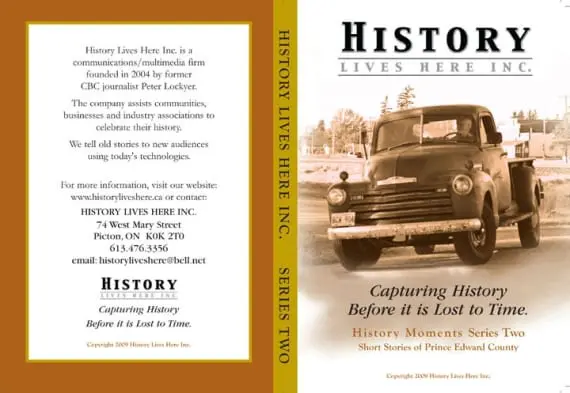
We launched the vignettes last year as part of the 225th anniversary of the Loyalist settlement of Prince Edward County – a settlement that was a defining moment in our history and the story of Canada. The History Moments series is actually part of a trio of activities by the partnering organizations – History Lives Here, the Glenwood Cemetery, the museums of Prince Edward County and the Regent Theatre – to showcase local history, to enhance public awareness of the need to preserve our heritage and heritage organizations.
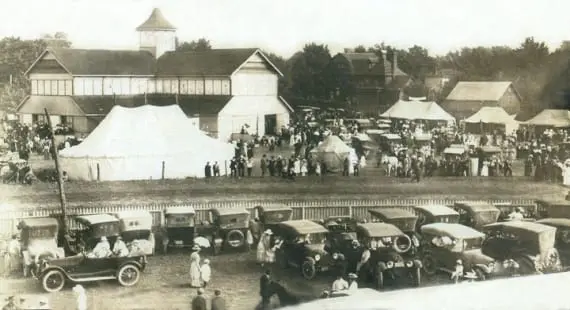
So we have also developed our Gallows and Graveyards walking tours of Picton on summer weekends. There’s one tonight at 6:30 that starts in the parking lot of Macaulay Museum on Church St. in Picton where a costumed guide takes you over to the old courthouse and gallows to hear the story of two men hanged in 1884 for a botched robbery in Bloomfield.
Saturday night’s tour at 6:30 begins in the restored Chapel at the Glenwood Cemetery in downtown Picton and takes you on a tour of this historic Victorian cemetery that remains a “timepiece” just as it was when it opened in 1873.
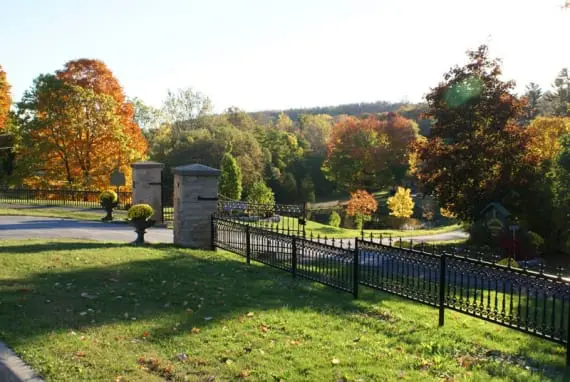
We also launched an historical lecture series this year in March with a lecture by Picton native Judge Robert Sharpe of the Ontario Court of Appeal who is completing a book on the 1884 double hanging. Judge Sharpe reviewed the case and the key question – did we hang two innocent men 126 years ago? We are now planning the next lectures in our series scheduled for the fall.
We haven’t charged any admission for this presentation today. My community partners in this history project felt pretty strongly that nobody was ever going to pay any money to hear me speak.
But I thought you might be interested to know just how this project came about and how the group of us got into the history business. I used to work with CBC Radio and Television and I liked to ask that question of people I interviewed. Why are you doing what you’re doing? It led to some pretty interesting conversations – which was good because I really wasn’t prepared to ask them anything else.
In 2000, I came home to Picton after over 30 years away. The people here seemed willing to forgive and forget.
I got involved with the Glenwood cemetery, a beautiful 62-acre cemetery in the heart of Picton. That was a rough time for Glenwood. It has suffered 50 years of neglect and everything needed to be fixed. The place gave new meaning to the word “non-profit.”
I might not have gotten involved if I actually had realized how much work was going to be involved. In that way, it was a little bit like my first marriage. But a small group of us persevered, and we decided we needed to tell the community about the history of Glenwood, our vision for it, and how they could help.
So we wrote a little brochure,and I wrote the words History Lives Here in it. I don’t know where that came from, but I thought those three words described Glenwood so simply. I liked the phrase so much I started a company called History Lives Here to work with community heritage groups to market their history.
A decade later, Glenwood is a different place – although the restoration work is still continuing. And we here today talking about some of the historical services we have developed in partnership with other community groups like the Regent and the museums of Prince Edward County.
The 2010 History Moments series
The centerpiece of our history initiatives is the History Moments series. This year we have 12 vignettes sponsored by local businesses and community organizations.
I’d like to thank our sponsors – not just for their sponsorship dollars (although we do appreciate that) but also for their belief in what we’re doing. It’s very encouraging.
Our 2010 sponsors are:
Elizabeth Crombie of Royal LePage Realty and Shelagh Mathers of Mathers Law Office, The Friends of the Maritime Museum, The Sandbanks Provincial Park and the Friends of the Sandbanks Park, The Waring House Inn, Claramount Inn and Spa, The Prince Edward Stewardship Council, Reynolds and Murray Chartered Accountants, Lloyd’s Heating and Cooling, The Black Prince Winery (who will be providing complimentary History Lives Here wine following our presentation), The Boulter Orange Lodge, Essroc Cement, the Inrig Family, and The Glenwood Cemetery.
WHY DOES THIS MATTER?
Why bother will all this old stuff from a long time ago? I’m sometimes asked that – and here’s what I say:
The Aging of Canadian Volunteer Agencies
IT MATTERS BECAUSE THE FUTURE OF THE PAST IN MOST COMMUNITIES IS VERY UNCERTAIN.
Community and heritage organizations in small towns and big cities all across Canada are aging.
It’s just demographics really. All these organizations count heavily on volunteers to raise funds and to carry on the work they do. Their volunteer base is getting older; and they are tired -fatigued from years of fundraising and the struggle to stay open.
It’s a great folly to think that these organizations will always be here as they are today.
I could name you a dozen local organizations on the verge of folding unless there is a means of recruiting new volunteers within the next decade and finding new revenue streams to sustain them. This challenge to the volunteer sector won’t result in the loss of just one organization in one community. It’s going to be an unprecedented failure in communities all across Canada. And since these organizations raise millions of dollars collectively each year – at no cost to us for a wide range of worthy community causes – there will be a domino effect; a collapse of community.
We need to renew these organizations with a new and shared vision, forge new partnerships in our communities so groups compliment rather than compete for limited funds and volunteers, and to develop new revenue streams beyond municipal funding and grant programs. That’s why it matters.
Reaching A Future Generation of Volunteers
IT MATTERS because there is a future generation of volunteers now in schools who learn about history – but it’s apparently history that happened a long time ago someplace else. I would argue that history is all around us…and it’s unfolding everyday. We’re making history today. We need to develop professional products and services that engage and excite this next generation to get involved in their communities.
A Loss of Heritage
IT MATTERS because there is a pitched battle taking place in every community in Canada at the moment. It’s the one you hardly ever read about. But it’s a battle communities are losing badly. It’s the battle over our disappearing heritage.
In Picton this year, we lost an entire block of the downtown. We’re going to have a new mall sitting next door to the shopping mall we built in the late 1970s that knocked down some heritage houses. I used to live in one of these gracious old homes that lined our Main Street.
One block from our new shopping site is a 175 – year old former Methodist Church that is being demolished as we speak. This iconic structure is a landmark – a fixture of Main Street that will soon be gone.
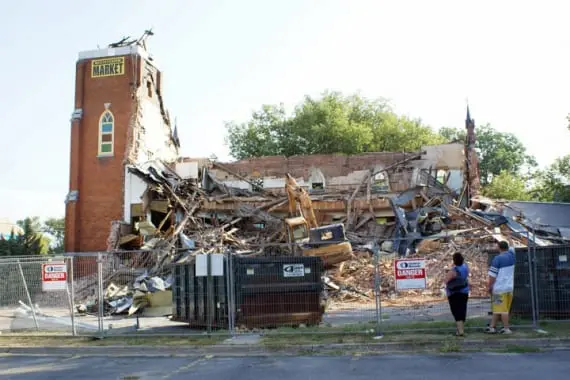
It’s across from the Bank of Montreal, which sits on the front lawn of one of Prince Edward County’s most historic houses – the residence of Captain John Pepper Downes built in the 1850s. You’ll get to see that house today in one of our vignettes. The building is surrounded by a shopping mall and other more modern developments. It’s needs a lot of work and it’s up for sale. Most likely, it will be decked for more parking spaces soon.
There are more demolitions scheduled. There have been many in the past. The old law office of Sir John A. Macdonald, our most famous resident, was demolished back in the late 1950s or early 1960s. It sat on the top of the town hill. John A. is the subject of our first vignette. It’s too bad his old office is no longer here since his 200th birthday will be celebrated nationally in 2015.
It’s true we have had some restoration successes – the Glenwood Chapel, the Crystal Palace and the grandstand were saved by some dedicated volunteers when we wanted to tear those down for parking spaces; Macaulay house and church were purchased by the municipality in 1974 and continues to be restored as a museum; some enlightened development has taken place along our Main Street to build condos and trendy shops in other buildings threatened with demolition.
It’s just that we can’t restore buildings as fast as we are destroying them.
So this matters because we are losing the battle to maintain our heritage in Prince Edward County. In the great rush for “sameness” to pave over farmland and rural landscapes, to make the entranceways to our county a bland blur of pavement, box stores and shopping malls. We have to ask ourselves if we tear down all the special places in our community, then what’s so special about our community?
On the worst of days, I’m always cheered by the fact that the pyramids are safe as long as they stay in Egypt -because in Prince Edward County we would have decked them a long time ago.
You might think I am anti-development. I’m actually not. I grew up here many years ago when this was a poor place. I think we can welcome box stores, shopping malls, and fast food places – just not at any cost.
I believe that we need to put heritage first – and not last – on our list of priorities. If heritage guided our planning and development decisions, we could have progress while saving our heritage and maintaining “this special place.”
A LOST ECONOMIC OPPORTUNITY
FINALLY IT MATTERS because the loss of our heritage is also a lost economic opportunity.
We talk a lot here about our creative economy. And indeed there are many creative people who now live here. But what if we were even more creative?
What might have happened if we had encouraged the box stores, fast food places and shopping malls to redevelop Camp Picton – our old army camp. It’s minutes from the downtown core; it has a wonderful view of the harbour; it’s not on prime farmland, and it needs development. What a shopping experience that could have been for visitors to say they shopped in stores on an old restored army camp.
What would happen if we helped the agricultural society renew the Picton Fair, one of our featured vignettes today and an organization celebrating its 175th anniversary this year? What if we helped to transform the current fair into an 1880s period fair with displays of old farm equipment and tractors, antique shows, period meals cooked by county chefs, classes in quilt making and food preservation, exhibits drawn from our museums on The Barley Days, the canning era, a film festival of old films about Prince Edward County – there are a least 5 of them we have uncovered at the National Archives; the photographs of the County by two period photographers from the 1880s, and ‘90s, William James Topley (1845 – 1930) and Marsden Kemp, an amateur photographer who lived in Kingston and Picton up until the 1940s. This could be.
Every month there are 68 million around the world who google the word “history”. They’re looking for history. We have it.
The History Channel in the U.S. and Canada were formed to match advertisers with a consumer demographic – baby boomers and their parents who are now in the midst of the greatest wealth transfer in the history of the world. (This seems to be news to my Mom…but it’s actually happening).
Gettysburg in the United States is best known for three days of history – for a battle that took place there in the 1860s during the American Civil War. It’s worth over $90 million dollars a year to them from the 1.5 million visitors they receive annually. It’s created almost 3000 jobs.
We have a little more than three days of history. We have 226 years of Loyalist settlement.
We need to take this “hidden history” lying dormant in our archives, libraries, museums and cemeteries and transform it into “popular history” that meets the market –based demand for professionally produced products and services on heritage themes. This is the hidden wealth within our community….a renewable and sustainable resource because we will never, ever run out of history. I believe we should market it; place it on our municipal books as an asset rather than an afterthought. We should forge a new vision for our community that places history and heritage first as defining principles for our development.
Prince Edward County has around 700,000 visitors every year. What if we sold them $10 worth of heritage each year by telling them these old stories? What if the money went into a heritage fund that sustained our historic properties, helped the museums add to their collections of local materials, helped us work with property owners and developers to retain our heritage buildings because we had the money to do it?
This is why history and heritage matter – why these History Moments, our walking tours, our lecture series and a whole host of other heritage activities here matter.
I began today by saying that my company tells old stories to new audiences. Let us now tell you 12 wonderful stories about Prince Edward County.
I don’t do this work alone. I have 14 wonderfully talented associates living in Ottawa, Toronto, Kingston, Picton and places in between. When you watch these, know that this work is also their work. And they are very, very good at what they do.
And afterwards, I hope you will join us for a reception and a glass of History Lives Here wine by our sponsor The Black Prince Winery. Thanks for coming.
Remarks by Peter Lockyer
History Lives Here Inc.
August 6, 2010
